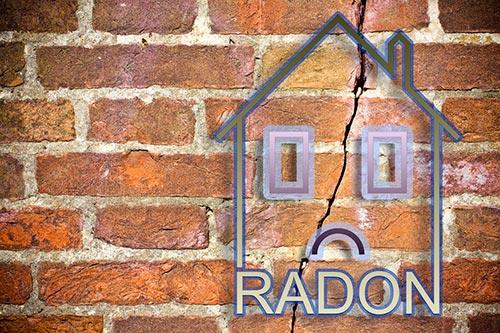Radon Testing

Why should I test for Radon?
Radon is a radioactive colorless, odorless gas that occurs naturally in the soil and can enter the home through cracks and gaps in the foundation. Long term exposure to high levels of radon causes lung cancer. The Environmental Protection Agency has set a safe level for radon in the home. Protect yourself and your family. Get your home tested today to see if the air contains an unsafe level of radon. Unsafe levels of radon can be corrected by licensed contractors. The national average cost for radon remediation is less that $2000.00.
Radon has been found in homes all over the United States. It comes from the natural breakdown of uranium in soil,rock, and water and gets into the air you breathe. Radon typically moves up through the ground to the air above and into your home through cracks and other holes in the foundation. Radon can also enter your home through well water.
Your home can trap radon inside. Any home can have a radon problem. This means new and old homes, well sealed and drafty homes, and homes with or without basements. In fact, you and your family are most likely to get your greatest radiation exposure at home. That is where you spend most of your time.
Nearly one out of every 15 homes in the United States is estimated to have an elevated radon level (4 pCi/L or more). Elevated levels of radon gas have been found in homes in your state. Contact your state radon office for information about radon in your area.
I’m Selling a Home. What Should I Do?
Have a test taken as soon as possible. If you can, test your home before putting it on the market. You should test in the lowest level of the home that could be used regularly. This means testing in the lowest level that you currently live in or a lower level not currently used, but which a buyer might use as a family room or play area, etc.
The radon test result is important information about your home’s radon level. Some states require radon measurement testers to follow a specific testing protocol. If you do the test yourself, you should carefully follow the testing protocol for your area or EPA’s Radon Testing Checklist. If you hire a professional to test your residence, protect yourself by hiring a qualified company such as Top Inspections LLC. It is a good idea to get a radon test as part of a home inspection. If you have any questions, call 215 432 5729 for free consult.
I’m Buying a Home. What Should I Do?
- Make sure that a radon test is done as soon as possible. Consider including provisions in the contract specifying:
- Where the test will be located;
- Who should conduct the test;
- What type of test to do;
- When to do the test;
- How the seller and the buyer will share the test results and test costs (if necessary); and
- When radon mitigation measures will be taken, and who will pay for them.
Make sure that the test is done in the lowest level of the home that could be used regularly. This means the lowest level that you are going to use as living space whether it is finished or unfinished. A state or local radon official or a qualified radon tester such as Top Inspections LLC can help you make some of these decisions. If you decide to finish or renovate an unfinished area of the home in the future, a radon test should be done before starting the project and after the project is finished. Generally, it is less expensive to install a radon-reduction system before (or during) renovations rather than after